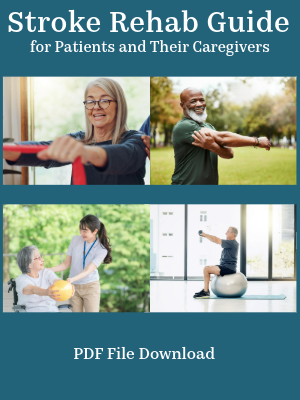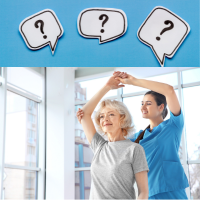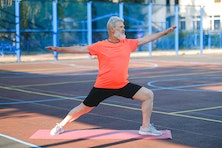Submissions from Readers
Stroke Tiredness
by RAY
(CROSSVILLE,TN )
Question: Last April, I had 3 strokes. I have all my faculties with the exception that I feel good for a day or two then it's like the bottom falls out from under me. I get really tired even after sleeping 8 or more hours. My brain hurts, my face tingles and burns on the left side . It's like all I want to do is sleep. I cannot think nor do I feel like moving. This is very depressing. I also feel dizziness.
Answer: It sounds like you are having nerve pain. I would consult your physician to see if there is a medication you can take to help with this. Sometimes one may have to try several medications to find one that works. Nerve pain after stroke can sometimes be very hard to treat and some nerve pain cannot be alleviated with medication, but it is worth a try. You can also try alternative techniques if you don't like medications. Alternative techniques might include massage, relaxation techniques, or acupuncture. There is no one set answer. Each individual is different as to what works for him or her.
Tiredness after stroke is not uncommon. You may need to find a sleep pattern that works for you. Sometimes short naps may be needed during the day rather than trying to sleep longer hours at night. Another factor to look at is any medications you are currently taking. Antidepressants and many other medications can make you sleepy. You can look online for effects of medication or interactions between medicines. I recommend that all patients review their medications with their doctor and understand all side effects and interactions. Sometimes medications get prescribed that shouldn't be mixed especially when more than one doctor is involved in your care.
I also want to say that if you have talked to your physician, and he or she doesn't have any answers for you, find another physician. A good doctor will listen to you and work with you to help alleviate your symptoms. You might want to see a neurologist or other MD that specializes in working with stroke patients to get the best help. Before you go to see a MD, make a list of all the symptoms that are bothering you. It might even help to keep an activity journal and see if symptoms occur more after certain activities or at a particular time of day. Many patients do not prepare when they go see the doctor and then forget to ask questions or mention problems they are having. Taking a list with you will make your visit more productive.
Energy, Memory and Depression
by Susanna
(Canada)
Question: My mom had a stroke a few years ago. She has several health problems, but she is quite certain that since her stroke she's had alot more trouble remembering things. I definitely notice that her speech patterns have changed every so slightly. I also notice that she gets really exhausted really fast and is a little bit depressed.
Her stroke was quite mild compared to a lot of people. She can still walk, talk and the physical effects are very minor.
But, I'm just wondering what I can do to help her?
Are these things normal? Are there herbs, certain exercises or whatever that have been known to help?
Answer: It is common to suffer post-stroke fatigue and depression even after a mild stroke. Increased mortality has been identified in those who experience post-stroke fatigue and depression, especially in those who are single and don't have a good support system. I encourage you to examine the following factors to help your mom combat fatigue/depression:
1) Examine all medications she takes, and make sure fatigue is not a side effect. If it is, ask her MD if there is an alternative medicine that doesn't cause fatigue.
2) Find out how she is sleeping. If sleep is an issue, she can discuss medications or herbal remedies with her physician that might help improve her sleep pattern.
3) Make sure she is managing other medical conditions. Having her bloodwork checked might indicate other factors that could contribute to fatigue (i.e. anemia, problems with blood sugar, etc.)
4) Make sure she is keeping fit. According to studies, exercise helps improve depression/fatigue. Aquatic exercise or walking may be good alternatives. Find something she likes to do that will promote improved fitness.
5)Check with her MD to see if she has clinical depression which may need treatment with medication or counseling.
6) There may be herbal remedies that can help with her symptoms, however, do not allow her to take anything without consulting her physician first.
7) Socialization is important. Try to get her involved in activities that require socialization with others.
8) Practice cognitive exercises that will help combat mental fatigue. This could be crossword puzzles or simply playing games with the family.
9) Make sure she is taking rest breaks and naps as needed. If she is doing her own cleaning, cooking, driving, and shopping, it may be too much for her. She may need help with these tasks even though she seems physically capable. You can search "energy conservation techniques" on the internet which will supply many ideas on making daily tasks easier.
Treatment Tips from Others
To see tips from other survivors and caregivers about their treatment recommendations, click here.
Get Our Stroke Rehab Guide

Our stroke rehab guide is designed specifically for patients and caregivers. It's in pdf format and can be immediately downloaded. It includes about
- Stroke Definition & Causes
- Stroke Treatment
- Rehabilitation Information for Physical, Occupational and Speech Therapy
- Exercise pictures
- Q&A from patients and caregivers
- Adaptive Equipment & Techniques
- How to Prevent Another Stroke & More!
Medical Disclaimer: All information on this website is for informational purposes only. This website does not provide medical advice or treatment. Always seek the advice of your physician or other healthcare provider before undertaking a new healthcare or exercise regimen. Never disregard professional medical advice or delay seeking medical treatment because of something you have read on this website. See the disclaimer page for full information.
- Home
- Stroke Questions
- Energy, Memory and Depression
















